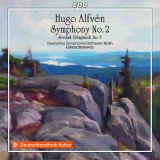Als unerschütterlicher Spätromantiker erlitt der Schwede Hugo Alfvén (1872-1960) das Schicksal all jener, die sich nicht den musikalischen Strömungen ihrer Zeit anpassten: er wurde ‘schubladisiert’. Daran änderten auch einige Einspielungen in den Sechziger- und Siebzigerjahren nichts. Mittlerweile gibt es schon mehr Einspielungen, und die Gesamtaufnahme der Symphonien mit dem Deutschen Symphonieorchester Berlin unter Lukas Borowicz hat bisher Maßstäbe gesetzt, welche die nun veröffentlichte Zweite Symphonie vollauf erreicht. Sie ist so gut, dass sie zweifellos dem Beachtungsmangel für diesen Komponisten kraftvoll entgegenwirken müsste.
Die Zweite Symphonie ist ein sehr farbiges, sich an die Folklore anlehnende Komposition, von dem man den Eindruck hat, dass sie musikalische Geschichten erzählt, mal wohlgemut und positiv, mal schwermütiger und insgesamt recht dramatisch. Lukas Borowicz pumpt viel Energie hinein, ohne die Botschaften der Musik zu verfälschen, ganz im Gegenteil. Die 50 Minuten lange Symphonie wird hier bedeutsamer denn je.
Die CD wird aufgefüllt mit der Schwedischen Rhapsodie Nr. 3, der Dalarapsodi, die die Visionen und Träume einer Hirtin wiedergibt, die einsam auf einem Berg sitzt und eine Melodie in ihr Horn lässt. Diese Melodie transportiert die im Grund traurige und melancholische Frau in einen Tanzsaal, wo sie sich zum volkstümlichen Tanz entwickelt. Diese zwei Seiten der schwedischen Seele, die Alfvén erklärtermaßen mit diesem Stück beschreiben wollte, werden in der Interpretation von Lukas Borowicz und dem DSO sehr anschaulich.
Wer romantische Symphonik mag, wird diese Werke mögen und er wird sie sich gewiss nicht nur einmal anhören.
As a steadfast late romantic, the Swede Hugo Alfvén (1872-1960) suffered the fate of all those who did not adapt to the musical currents of their time: he was ‘pigeonholed’. Even some recordings in the sixties and seventies did not change this. In the meantime there are more recordings, and the complete recording of the symphonies with the Deutsches Symphonieorchester Berlin under Lukas Borowicz has so far set standards which the now released Second Symphony fully achieves. It is so good that it should undoubtedly powerfully counteract the lack of attention paid to this composer.
The Second Symphony is a very colorful folk-inspired composition, which gives the impression of telling musical stories, sometimes cheerful and positive, sometimes more melancholy and altogether quite dramatic. Lukas Borowicz pumps a lot of energy into it without distorting the music’s messages, quite the contrary. The 50-minute symphony becomes more meaningful here than ever.
The CD is filled out with Swedish Rhapsody No. 3, Dalarapsodi, which renders the visions and dreams of a shepherdess sitting lonely on a mountain and letting a melody into her horn. This melody transports the basically sad and melancholic woman to a dance hall, where it develops into a folk dance. These two sides of the Swedish soul, which Alfvén professedly wanted to describe with this piece, become very vivid in the interpretation of Lukas Borowicz and the DSO.
Those who like romantic symphonies will like these works and they will certainly not listen to them only once.
























